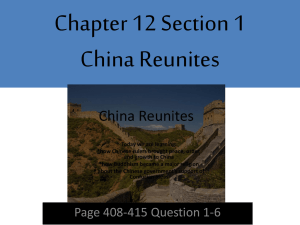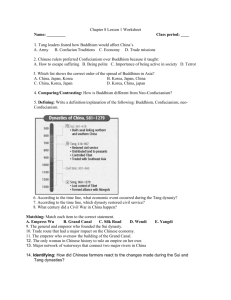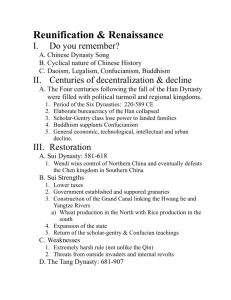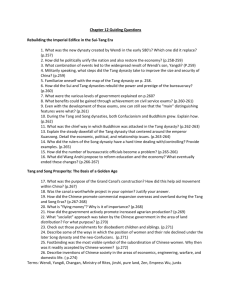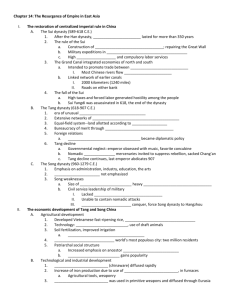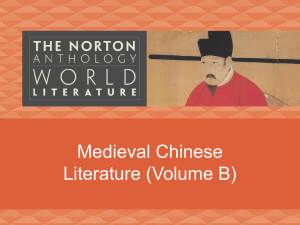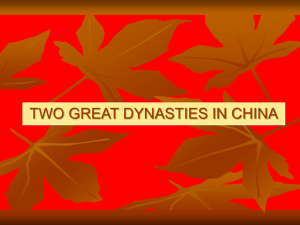Improvements and Reforms - Centennial School District
advertisement
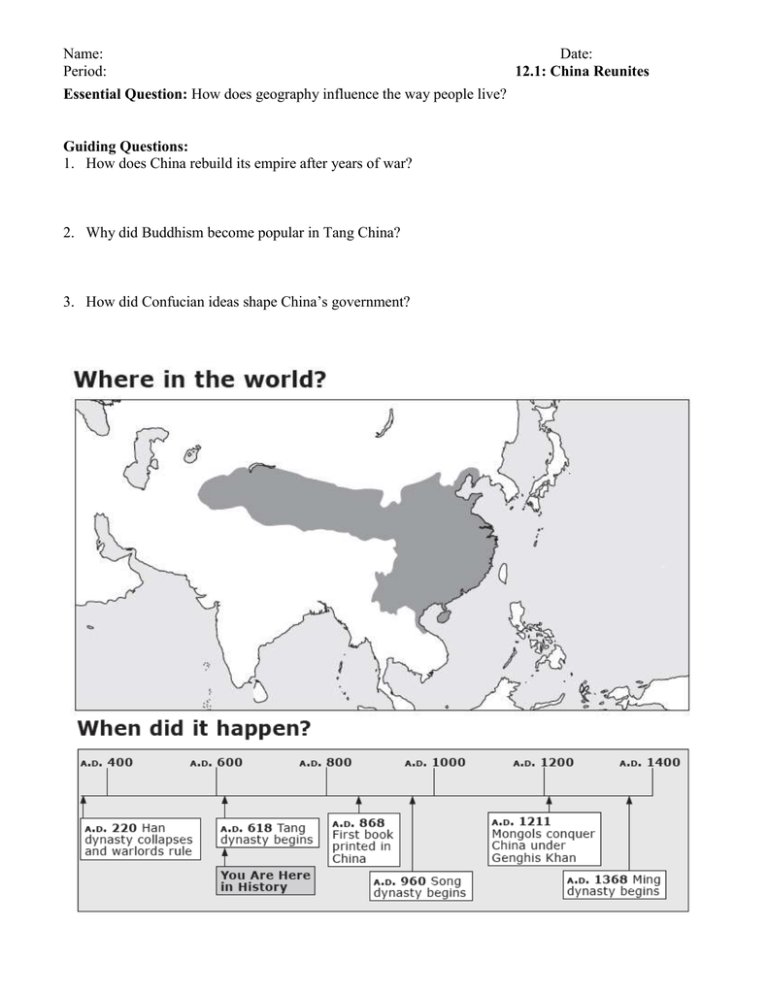
Name: Period: Essential Question: How does geography influence the way people live? Guiding Questions: 1. How does China rebuild its empire after years of war? 2. Why did Buddhism become popular in Tang China? 3. How did Confucian ideas shape China’s government? Date: 12.1: China Reunites Directions: Read all the questions listed below. Use the reading China Rebuilds Its Empire to answer the questions. You must follow the Before, During, and After Reading Strategies identified and explained in class. This includes writing your answers using completed sentences. This means that most of the question should be written in your answer. Failure to do so will result in you having to “redo” and resubmit the assignment. China Rebuilds Its Empire China’s Han Empire ended in A.D. 220. For the next 300 years, Chinese warlords fought with each other. China finally unified again under a general named Wendi. He set up a new dynasty called the Sui in which emperors ruled. After Wendi died, his son Yangdi became emperor. Yangdi rebuilt the Great Wall. Yangdi’s biggest job was building the Grand Canal. The Grand Canal was used to ship products between northern and southern China. It helped make China’s economy stronger. Yangdi made life very hard for the Chinese people, however. He made farmers work on the Great Wall and the Grand Canal. The people also had to pay for these projects with high taxes. The farmers became so angry that they killed Yangdi. When Yangdi died, the Sui dynasty ended. In A.D. 618, one of Yangdi’s generals made himself emperor. He set up a new dynasty called the Tang. The most powerful Tang emperor was Taizong. During his rule, he made many reforms that brought about improvements in China. Taizong went back to using special tests called civil service examinations for choosing government officials. Government leaders were once again chosen based on how well they performed on the exams. Taizong also gave land to farmers and brought order to the countryside. During the late A.D. 600s, a woman named Wu became the only woman in Chinese history to rule the country on her own. As a strong leader, Empress Wu made the government bigger. She also made the military stronger. Improvements and Reforms Sui Dynasty brought back law and order built Grand Canal helped China’s economy grow Tang Dynasty brought back civil service examination gave land to farmers brought order to the countryside made the military stronger China grew strong again under the Tang. In the mid-A.D. 700s, however, the Tang dynasty began to have problems. A new group of nomads, the Turks, took control of central Asia and the Silk Road, an important trade route. Chinese farmers and people in Tibet also rose up against the Tang. The dynasty ended in A.D. 907. Eventually, a general named Song made himself emperor. The Song dynasty was a time of great wealth and rich culture, but Song rulers did not have enough soldiers to control their large empire. Nomads took over land in northern China and the people in Tibet broke away from the empire. The Song moved their capital south to the city of Hangzhou for safety. 1. Defining: What is a dynasty? _________________________________________________________________________ _________________________________________________________________________ _________________________________________________________________________ 2. Contrasting: How were Yangdi and Taizong different as rulers? _________________________________________________________________________ _________________________________________________________________________ _________________________________________________________________________ 3. Identify: What was the main reason the Tang dynasty ended? _________________________________________________________________________ _________________________________________________________________________ _________________________________________________________________________ 4. Reading Check: How did the Grand Canal help China’s economy? _________________________________________________________________________ _________________________________________________________________________ _________________________________________________________________________ Directions: Read all the questions listed below. Use the reading Buddhism in China to answer the questions. You must follow the Before, During, and After Reading Strategies identified and explained in class. This includes writing your answers using completed sentences. This means that most of the question should be written in your answer. Failure to do so will result in you having to “redo” and resubmit the assignment. Buddhism in China Traders and missionaries from India had brought Buddhism to China in about A.D. 150. A short time later, a civil war started. Many people suffered greatly. Buddhism taught that people could escape their suffering. Many Chinese who were looking for peace and comfort became Buddhists. Early Tang rulers were not Buddhists, but they allowed people to practice Buddhism and build Buddhist temples. Many Chinese Buddhist nuns and monks ran schools. They also provided rooms and food for travelers. Buddhist monks served as bankers and gave medical care. Civil war breaks out. Chinese people suffer. Many become Buddhists. Buddhists help the poor and needy. Buddhists gain wealth and power. Tang rulers try to destroy Buddhism. Some Chinese did not like Buddhism. Many thought the monasteries were gaining too much wealth. Others thought that monks and nuns did not encourage respect for families because they did not marry. In A.D. 845, the Tang destroyed many Buddhist monasteries and temples. Buddhism in China would never be the same. Korea broke free from China when the Han dynasty fell. Chinese Buddhists brought their religion to Korea. In about A.D. 660, the Koreans came together to form one country. The new government supported Buddhism in Korea and even spread to the islands of Japan. 5. Drawing Conclusions: Why was Buddhism first accepted and then ended by Tang rulers? _________________________________________________________________________ _________________________________________________________________________ _________________________________________________________________________ 6. Examining: How did the civil war affect the people of China? _________________________________________________________________________ _________________________________________________________________________ _________________________________________________________________________ 7. Reading Check: How did Buddhist monks and nuns help the Chinese? _________________________________________________________________________ _________________________________________________________________________ _________________________________________________________________________ 8. Check for Understanding: Name one condition in China that opened people to the teachings of Buddhism? _________________________________________________________________________ _________________________________________________________________________ _________________________________________________________________________ Directions: Read all the questions listed below. Use the reading Revival of Confucian Ideas to answer the questions. You must follow the Before, During, and After Reading Strategies identified and explained in class. This includes writing your answers using completed sentences. This means that most of the question should be written in your answer. Failure to do so will result in you having to “redo” and resubmit the assignment. Revival of Confucian Ideas Confucius and his followers believed that a good government depended on wise leaders. The Tang dynasty supported neo-Confucianism, a new kind of Confucianism. It taught that life in this world was just as important as life in the next one. Neo-Confucianism became more than a list of rules. It became a religion. Neo-Confucianism also helped make the government stronger. In the past, jobs had been given to people because of their wealth, family, or friends. Now the government hired people based on their knowledge and ability to think. People taking civil service examinations had to show how much they knew about Confucian writings. Only men could take the tests, and only rich people had enough money to help their sons study for the tests. It took years of study and only one out of every five men passed. Those who failed could become teachers, but they could never get a government job. Neo- Confucianism Live in this world. Help others. Find peace. Enjoy nature. Serve your community. 9. Making Connections: What do people today spend years of training to do? _________________________________________________________________________ _________________________________________________________________________ _________________________________________________________________________ 10. Reading Check: How did the civil service examinations affect Chinese society? _________________________________________________________________________ _________________________________________________________________________ _________________________________________________________________________ 11. Identify: What advantage do rich people have in a neo-Confucian style government? _________________________________________________________________________ _________________________________________________________________________ _________________________________________________________________________ 12. In the space below, create an illustration which depicts a belief of Neo-Confucianism.
